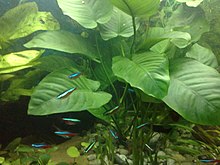Anubias barteri var. caladiifolia
| Anubias barteri var. caladiifolia | |
|---|---|

| |
| Scientific classification | |
| Kingdom: | Plantae |
| Clade: | Tracheophytes |
| Clade: | Angiosperms |
| Clade: | Monocots |
| Order: | Alismatales |
| Family: | Araceae |
| Genus: | Anubias |
| Species: | |
| Variety: | A. b. var. caladiifolia |
| Trinomial name | |
| Anubias barteri var. caladiifolia Engler | |
Anubias barteri var. caladiifolia was first described by Adolf Engler in 1915.[1]
Distribution
West Africa: South-west Nigeria, Fernando Po, Cameroon.[1]
Description
This plant's large leave blades are 1.5-2.5 times as long (10–23 cm) as wide (5-14) cm long. The petioles are 10–54 cm long, from 1-2.5 times as long as the blade. The base of the leaf is typically lobed.[citation needed]
Cultivation
Like most Anubias species, this plant grows well partially and fully submersed and the rhizome must be above the substrate, attached to rocks or wood. It grows well in a range of lighting and prefers a temperature range of 22-28 degrees C. It can be propagated by dividing the rhizome or by separating side shoots.[citation needed]
References
- ^ a b Crusio, W. (1979). "A revision of Anubias Schott (Araceae). (Primitiae Africanae XII)". Mededelingen Landbouwhogeschool Wageningen. 79 (14): 1–48.
